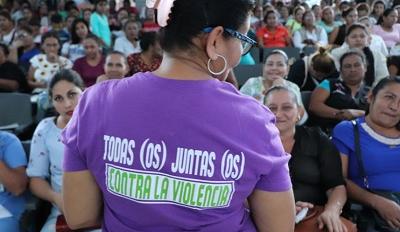
Even with every effort being made to prevent gender-based violence at work, it’s not possible to eliminate it entirely in a world that prioritizes the desires of men over the safety of women and people of other/no genders. As the International Labour Organization prepares to adopt a Convention on Violence and Harassment in the World of Work, it is paramount that it identify that unions and collective bargaining are critical to preventing gender-based violence. Whether it be global, national or local labor unions, worker centers, or any organizations that genuinely represent the interests of workers, labor must be an integral creator and implementer of any programs to address violence and harassment.
According to the Worker-driven Social Responsibility Network’s principles, “workers are the only actors in the supply chain with a vital and abiding interest in ensuring their rights are protected.” Worker-driven solutions are those that create avenues for workers’ effective access to legal remedy, enable workers to fully participate in ongoing vigilance of factory conditions, foster greater transparency, and address the role of brands’ purchasing practices as root causes of violations. The forthcoming ILO Convention must support worker-driven solutions in order to facilitate real changes for workers on the ground.
--
In Bangladesh, where the vast majority of garment workers report regularly experiencing sexual harassment or verbal abuse, short-term responsive organizing is constantly necessary to protect workers. The workers interviewed for ILRF’s report Our Voices, Our Safety described a chilling web of social relations of intimidation and violence that spans factories and apparel companies, workers’ communities, government agencies, law enforcement, and even their families. The effect of this web is that workers are silenced when they speak out as individuals. But, together, change is possible.
One participant in a focus group I co-facilitated in Dhaka, Anju*, told the story of an impromptu work stoppage she had organized that very morning in defense of a sewing helper working on her floor. The helper was being blackmailed by a supervisor into starting a sexual relationship with him, or else be transferred to an area of the factory known for excessive production targets and overwork. When she was summoned to the management office after refusing the supervisor’s advances, Anju intervened and organized the entire production floor to stop work and strike at the time of the helper’s appointment. After some negotiations, the supervisor was fired.
--
In the long-term, strong unions that focus on gender-based violence can create larger scale solutions. In Honduras, the Female Banana Workers Regional Agenda, was established in 2001 (and renewed every two years) to tackle work and social conditions, employment/unemployment, occupational health and safety, leadership, and policies for women. Together, the Coordinating Body of Latin American Banana and Agroindustrial Unions’ (COLSIBA) Women’s Committee have developed an agenda of pro-women clauses to include in collective bargaining proposals and strengthened the leadership of many women workers, such that women now have equal representation in leadership roles within the union federation.
The same year, COLSIBA, the International Union of Foodworkers (IUF) and Chiquita signed a historic international framework agreement that ensured Chiquita’s commitment to respect freedom of association in all of its Latin American banana operations. In 2013, the Women’s Committee secured a clause in Chiquita’s Code of Conduct that implemented a zero tolerance for sexual harassment; three cases of sexual assault have been resolved in favor of women workers since then.
Only when workers and the organizations that represent them lead campaigns for change, will power imbalances that foster exploitation be reformed. Workers are who make labor rights meaningful. Government policies, trade agreements, and business practices should be crafted to enable and protect workers in exercising those rights. The ILO must take this opportunity to create instruments that recognize and lift up the power of collective action.

